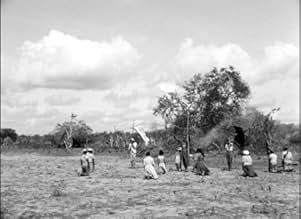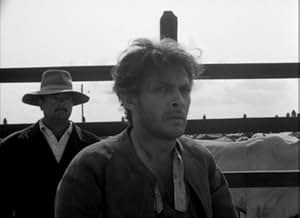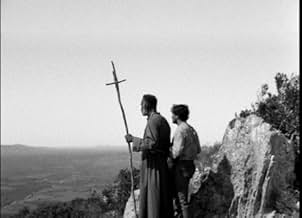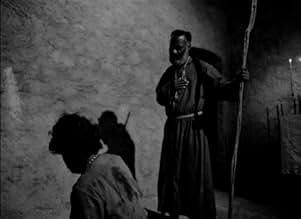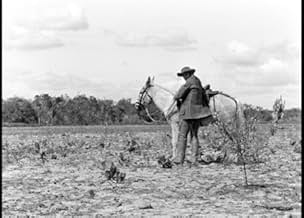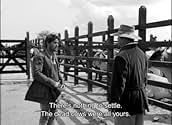IMDb रेटिंग
7.2/10
5.9 हज़ार
आपकी रेटिंग
अपनी भाषा में प्लॉट जोड़ेंAfter killing his employer when he tries to cheat him out of his payment, a man becomes an outlaw and starts following a self-proclaimed saint.After killing his employer when he tries to cheat him out of his payment, a man becomes an outlaw and starts following a self-proclaimed saint.After killing his employer when he tries to cheat him out of his payment, a man becomes an outlaw and starts following a self-proclaimed saint.
- निर्देशक
- लेखक
- स्टार
- पुरस्कार
- कुल 1 नामांकन
Milton Rosa
- Moraes
- (as Milton Roda)
Marrom
- Cego Júlio
- (बिना क्रेडिट के)
फ़ीचर्ड समीक्षाएं
I loved the first two-thirds of this jaw-dropping epic. For my second viewing, this time with a friend, we both agreed that it fell to pieces after that point, becoming incoherent and unfathomable, whilst still being stylish and remaining 'strange'.
The visual sense was part 'Aguirre, Wrath of God' and Sergio Leone's 'Once Upon a Time in the West'. But, in grainy, high contrast black & white. Camera movements are urgent rather than flowing with the odd editing flourish to enliven the action. We both found this approach initially utterly mesmerising.
This film is of hardcore fanaticism, with religious bigotry and the sheer survival in the harsh scrub desert-lands of northern Brazil. Some scenes are reminiscent of Russian cinematic masterpieces by Eisentstein, as in Ivan the Terrible. I think some scenes will offend and appal many viewers whilst still retaining mystery and that 'Wow, this is something totally different and exciting'. The sort of film that has the critics swooning but with the actual film-lover rather less than overawed.
I'd rather not go into all the narrative in and outs, mostly because it is the overall effect and impression that it has left on me. Unforgettable, true; daring and significant, undoubtedly. But that doesn't make it a film any easier to watch, though. I would give the first two thirds 9/10 and the remainder five.
The visual sense was part 'Aguirre, Wrath of God' and Sergio Leone's 'Once Upon a Time in the West'. But, in grainy, high contrast black & white. Camera movements are urgent rather than flowing with the odd editing flourish to enliven the action. We both found this approach initially utterly mesmerising.
This film is of hardcore fanaticism, with religious bigotry and the sheer survival in the harsh scrub desert-lands of northern Brazil. Some scenes are reminiscent of Russian cinematic masterpieces by Eisentstein, as in Ivan the Terrible. I think some scenes will offend and appal many viewers whilst still retaining mystery and that 'Wow, this is something totally different and exciting'. The sort of film that has the critics swooning but with the actual film-lover rather less than overawed.
I'd rather not go into all the narrative in and outs, mostly because it is the overall effect and impression that it has left on me. Unforgettable, true; daring and significant, undoubtedly. But that doesn't make it a film any easier to watch, though. I would give the first two thirds 9/10 and the remainder five.
Nothing wrong with a movie that is being a bit slower and different, as long as it fascinates. And this movie does that well.
It's an unusual movie, with an unusual approach and story. This is not a slick Hollywood movie here but an artistic South-American one. It doesn't really follow any familiar movie rules but having said that, this movie at the same time still remains a perfectly accessible one.
Even though there are of course some deeper meanings behind it all, the movie never feels too serious or heavy handed. The movie actually still manages to entertain as well, which is for most part thanks to its very lively characters, who especially come to live in its second half. Most people seem to have most problems with the movie its second half but I actually do think that this was the strongest and most intriguing part of the entire movie, since it seemed to focus more purely on its characters and less on its story, that is a complicated one to follow and completely understand.
What I foremost love about this movie is that it's being shot like a western, while it's actually a totally different genre movie, set in Brazil. The cinematography, directing, characters and such still make this movie really feel and look like a good old spaghetti western.
Due to its directing approach and way of storytelling this is a very visual orientated movie. Even though it can be a slow movie at times, its visuals still manages to fully keep you interested throughout. It's black & white cinematography does ensure this well.
No need and reason to overpraise this movie but it remains simply a good and special one to watch.
7/10
http://bobafett1138.blogspot.com/
It's an unusual movie, with an unusual approach and story. This is not a slick Hollywood movie here but an artistic South-American one. It doesn't really follow any familiar movie rules but having said that, this movie at the same time still remains a perfectly accessible one.
Even though there are of course some deeper meanings behind it all, the movie never feels too serious or heavy handed. The movie actually still manages to entertain as well, which is for most part thanks to its very lively characters, who especially come to live in its second half. Most people seem to have most problems with the movie its second half but I actually do think that this was the strongest and most intriguing part of the entire movie, since it seemed to focus more purely on its characters and less on its story, that is a complicated one to follow and completely understand.
What I foremost love about this movie is that it's being shot like a western, while it's actually a totally different genre movie, set in Brazil. The cinematography, directing, characters and such still make this movie really feel and look like a good old spaghetti western.
Due to its directing approach and way of storytelling this is a very visual orientated movie. Even though it can be a slow movie at times, its visuals still manages to fully keep you interested throughout. It's black & white cinematography does ensure this well.
No need and reason to overpraise this movie but it remains simply a good and special one to watch.
7/10
http://bobafett1138.blogspot.com/
This film begins wonderfully, brilliantly shot and keenly acted- but right as you're sure it's coming to a close, the music suddenly runs uptempo and the narrator says the equivalent of "Wait, there's more!" and the second segment of the film destroys any credibility the first might have established. The director's portrayal of the desert's harshness lends logically to the lunacy of the characters- but Rosa's actions in the second half seem completely unmotivated, as if the actors ran out of script and just start making things up out of boredom in front of the camera. Laudable attempts at Eisenstein-style multiple-repeat editing are a good idea but using them to cover the low-budget nature of the action scenes is not. Overall worth seeing, but I must warn you that I fell asleep towards the end.
Glauber Rocha just 25 when he made this and I was only seven year younger although I had never watched this before but maybe then I might have loved it more but now I find it rather difficult. Clearly I can see that it is an amazing idea but punishing to have done this in Monte Santo, Bahia this drought-ridden hinterland of the North-East of Brazil. Manoel has killed his cheating ranch owner and then his mother dies and he and his wife go off to follow a self proclaimed saint. It is slow, and Christ like but also much violence. Although there is even more to come. It is difficult watching Manoel climb up the mountain on his knees and with a 20 kilo stone on his head and apparently the actor decided he should really do it. I found that during this part I thought of Bunuel with Simon of the Desert (1965) and his man on a column. Towards the end with the last few people moving between each other and I thought of Michelangelo Antonioni. Now and again I wondered about Jodorowsky's El Topo (1970), however this film is on its own and even if it is a bit slow it is surely worth a look.
Like Karl Marx's Communist Manifesto, Deus e O Diabo Na Terra Do Sol, (translated: God and the Devil in Land of Sun) doesn't bother mincing words when addressing what's wrong with the world. As Communism swept through South America and Cuba in the 50's and 60's, Socialist film-making enjoyed its greatest hey dey and, amongst those films, DeODNTDS is remembered as one of the best. Whereas films like Mikhail Kalatozov's I Am Cuba were unabashed agents of propaganda, bashing Capitalism with a hammer-like heavy hand, Glauber Rocha's efforts were hidden behind the symbolism of one man's Chaucer-esque journey into an unknown fate.
The journey is Manuel's, an impoverished farmer who is radicalized after killing his boss who (like evil capitalists do) attempted to cheat Manuel of his wages. Manuel then finds God, in the form of a self-proclaimed Saint named Sebastian. Before long, Sebastian's blood thirsty spell over Manuel is broken by Rosa, Manuel's dutiful (and long-suffering) wife. But soon after they're free from Sebastian's grip, Manuel is seduced by the charms of a charismatic and similarly blood thirsty bandit named Corisco. Such is the way with Manuel, doomed to follow, and it is this theme that strangles the life out of Rocha's film.
DeODNTDS is a scathing indictment of not only capitalism, but also of religion and society as a whole. In this world, man is desperately out of balance with nature (and thus himself), wishing (and prophesying) for the land to turn to sea and the sea to turn to land. These fruitless dreams are a constant reminder that man must look inward, to find strength from his own heart and hands. The message is unmistakable, as stark as the black and white imagery Rocha bombards us with, but the trouble with DeODNTDS is that it makes it's point early on is compelled to repeat it over and over again, not unlike a mantra.The inevitable fate of Manuel is set up mid-way through the first act, when bounty hunter Antonio das Mortes is hired by church and city officials to kill Saint Sebastian and put an end to his proletariat uprising (which threatens the establishment aka the money making machine). But das Mortes' hunt is sidetracked and ultimately stalled to such a degree that by the time he and Manuel come face to face, no real stakes remain. In the process of pitting these two against one another, Rocha's film gets bogged down in dogmatic digressions that drag out for what feels like an eternity. By the time the credits roll, the momentum of the powerful first act is lost, and instead of challenging its audience's socio-political allegiances, Deus eO Diablo Na Terra Do Sol merely challenges you to stay awake.
The journey is Manuel's, an impoverished farmer who is radicalized after killing his boss who (like evil capitalists do) attempted to cheat Manuel of his wages. Manuel then finds God, in the form of a self-proclaimed Saint named Sebastian. Before long, Sebastian's blood thirsty spell over Manuel is broken by Rosa, Manuel's dutiful (and long-suffering) wife. But soon after they're free from Sebastian's grip, Manuel is seduced by the charms of a charismatic and similarly blood thirsty bandit named Corisco. Such is the way with Manuel, doomed to follow, and it is this theme that strangles the life out of Rocha's film.
DeODNTDS is a scathing indictment of not only capitalism, but also of religion and society as a whole. In this world, man is desperately out of balance with nature (and thus himself), wishing (and prophesying) for the land to turn to sea and the sea to turn to land. These fruitless dreams are a constant reminder that man must look inward, to find strength from his own heart and hands. The message is unmistakable, as stark as the black and white imagery Rocha bombards us with, but the trouble with DeODNTDS is that it makes it's point early on is compelled to repeat it over and over again, not unlike a mantra.The inevitable fate of Manuel is set up mid-way through the first act, when bounty hunter Antonio das Mortes is hired by church and city officials to kill Saint Sebastian and put an end to his proletariat uprising (which threatens the establishment aka the money making machine). But das Mortes' hunt is sidetracked and ultimately stalled to such a degree that by the time he and Manuel come face to face, no real stakes remain. In the process of pitting these two against one another, Rocha's film gets bogged down in dogmatic digressions that drag out for what feels like an eternity. By the time the credits roll, the momentum of the powerful first act is lost, and instead of challenging its audience's socio-political allegiances, Deus eO Diablo Na Terra Do Sol merely challenges you to stay awake.
क्या आपको पता है
- ट्रिवियाIn the scene where we see Manuel (Geraldo Del Rey) carrying a huge stone over his head while climbing Monte Santo on his knees, Del Rey insisted on carrying a real stone that weighted over 20 kilos - something that really worried director Glauber Rocha. After the shooting, Del Rey had to take 2 days off, as he wasn't in condition to show up.
- कनेक्शनEdited into A Edição do Nordeste (2023)
- साउंडट्रैकManuel e Rosa
Written by Glauber Rocha & Sérgio Ricardo
टॉप पसंद
रेटिंग देने के लिए साइन-इन करें और वैयक्तिकृत सुझावों के लिए वॉचलिस्ट करें
- How long is Black God, White Devil?Alexa द्वारा संचालित
विवरण
- रिलीज़ की तारीख़
- कंट्री ऑफ़ ओरिजिन
- आधिकारिक साइट
- भाषा
- इस रूप में भी जाना जाता है
- Black God, White Devil
- फ़िल्माने की जगहें
- उत्पादन कंपनियां
- IMDbPro पर और कंपनी क्रेडिट देखें
बॉक्स ऑफ़िस
- US और कनाडा में सकल
- $7,826
- US और कनाडा में पहले सप्ताह में कुल कमाई
- $3,200
- 19 नव॰ 2023
- दुनिया भर में सकल
- $7,826
- चलने की अवधि2 घंटे
- रंग
- ध्वनि मिश्रण
- पक्ष अनुपात
- 1.37 : 1
इस पेज में योगदान दें
किसी बदलाव का सुझाव दें या अनुपलब्ध कॉन्टेंट जोड़ें



